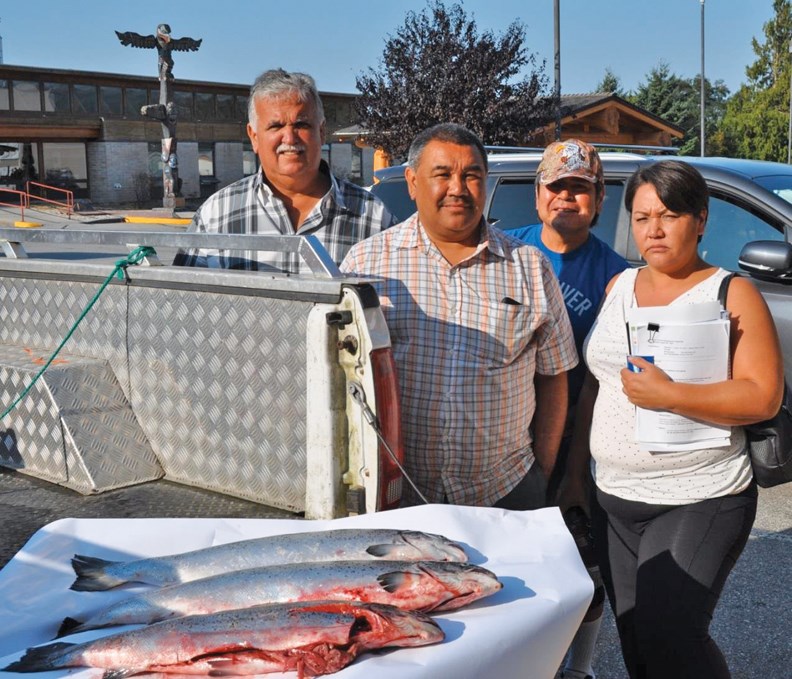The shíshálh Nation says three Atlantic salmon caught recently in Sabine Channel, between Texada and Lasquiti islands, are likely escapees from a Washington State fish farm.
Cooke Aquaculture blames extreme tides on Aug. 19 for the collapse of pens holding around 300,000 fish at its farm off Cypress Island in Puget Sound, about 150 kilometres south of Sabine Channel. It’s unclear how many fish escaped, but it’s believed to be in the tens of thousands.
According to the shíshálh Nation, members exercising their food, social and ceremonial fishing rights were out harvesting pink salmon in Sabine Channel on Sunday when they pulled in the suspected Atlantic salmon.
A necropsy conducted by shíshálh’s fisheries biologist has since confirmed all three were Atlantic salmon – two females and one male.
“There is a high probability that the Atlantic salmon are escapees reported on Aug. 19 from Cooke Aquaculture fish farm in Washington State,” said a release from the shíshálh Nation. “Unfortunately, the fish are not marked to allow for definitive source identification.”
Shíshálh Chief Warren Paull said the incident highlights the nation’s continuing concerns around open net fish farming.
“While these Atlantic salmon likely came from south of the border, it must be recognized that invasive species do not recognize borders. Now the question is not if, but when, these species are going to gain access to our streams,” Paull said.
He said the nation has raised questions and concerns repeatedly for over 15 years about the farming of Atlantic salmon.
“It seems the federal and provincial decision-making processes have been prioritizing the commercial interests of industrial finfish farms over our collective right to live as a distinct people with the wild, native fish populations and healthy marine environment that is central to our way of life.”
Paull said the discovery of escaped Atlantic salmon in shíshálh waters is “a source of grave concern” to the nation.
“We take our responsibility to steward our rights for the benefit of both current and future generations of our people very seriously,” he said. “We hope this situation can be contained and monitored, and that future decision-making around marine finfish aquaculture will be carried out through developing shared and collaborative decision-making processes with First Nations.
“Aquaculture activities require meaningful and comprehensive engagement with us. These activities present management issues with significant environmental, economic and cultural implications for the shíshálh Nation, and for coastal communities as a whole.”
The shíshálh Nation also said its resource management department has reached out to the Department of Fisheries and Oceans (DFO) repeatedly, but hasn’t received a satisfactory response.
“DFO has not yet taken any measures or provided a satisfactory response to how to address this crisis in a collaborative manner,” the nation’s release said. “Chief and council are concerned with the lack of urgency on the part of Fisheries and Oceans Canada to determine the extent of this large introduction of invasive species.”
Calling for a full investigation of the incident, the release adds that “immediate field work, shared with First Nations and other potentially impacted coastal communities, needs to be considered.”
In response to Coast Reporter’s request for comment, DFO officials said, “We are in touch with our U.S. counterparts at the National Oceanic and Atmospheric Administration (NOAA) and the Washington Department of Fish and Wildlife and will continue to monitor this incident with our partners.”
On the specific issues raised by the shíshálh Nation, DFO said: “DFO provides funding for stock assessment activities under its Aboriginal Fisheries Strategy agreement with shíshálh Nation. We have just started discussions with shíshálh Nation regarding reprioritizing those activities to include monitoring for Atlantic salmon in their local waters and welcome discussion of shíshálh Nation’s needs and concerns.”
DFO’s Atlantic Salmon Watch Program (ASWP) has been monitoring B.C. waters for escaped Atlantic salmon since 1991. Anglers who believe they’ve caught an Atlantic salmon are advised to keep the fish and file a report to ASWP at 1-800-811-6010.



